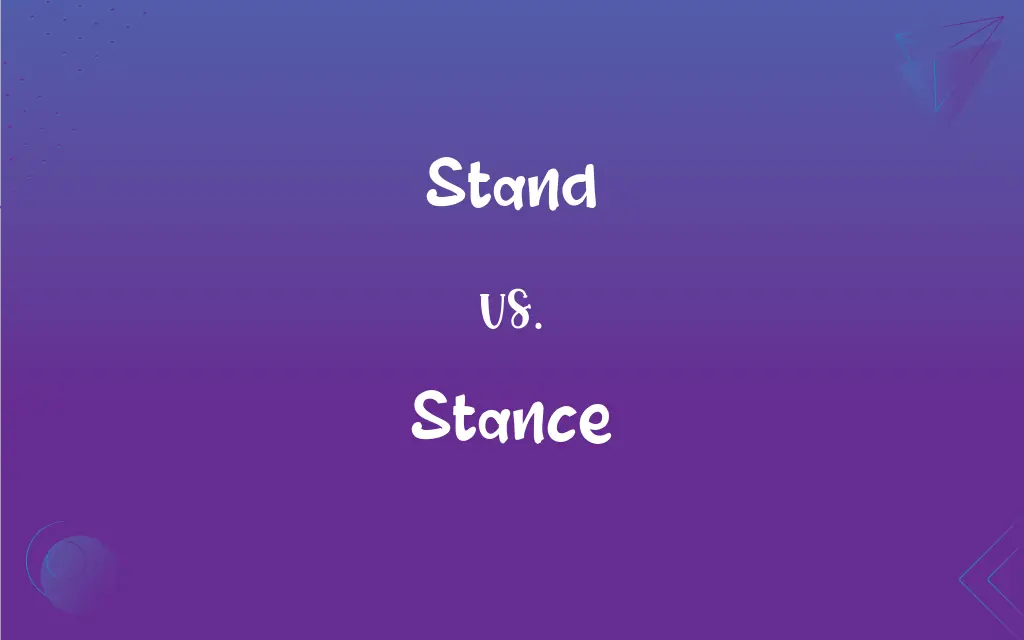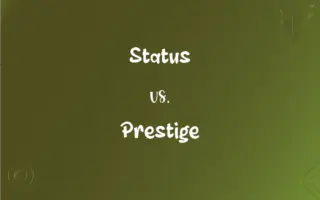Stand vs. Stance: What's the Difference?
Edited by Aimie Carlson || By Harlon Moss || Updated on November 6, 2023
Stand is the act of being upright on feet or a particular viewpoint, while stance refers to a physical positioning or an attitudinal posture.

Key Differences
Stand can mean to rise to an upright position on the feet or to adopt a particular attitude or position regarding a matter. When someone takes a stand, they are making their position on an issue known. This usage signifies action or commitment to a particular opinion or cause.
Stance, on the other hand, is the way in which someone stands, literally referring to their posture. It also means the attitude or position taken towards a situation or issue. However, unlike 'stand,' which implies a dynamic action or a moment of decision, 'stance' often implies a pre-existing condition or a longer-term attitude.
When discussing physical activity, to stand is the action of getting up or remaining upright, whereas a stance is a particular way one positions their feet and body, as in martial arts or sports. The term 'stance' suggests preparation and a readiness to engage.
In terms of expressing viewpoints, both stand and stance indicate a person's opinion or belief. However, taking a stand often suggests a readiness to defend or argue for that belief, while adopting a stance suggests a reasoned, considered position that one maintains over time.
In sum, 'stand' conveys both a physical and metaphorical action and is often used to express a change or initiation of state. 'Stance' is used to describe a physical posture as well as a figurative one but typically conveys a more static and deliberated position.
ADVERTISEMENT
Comparison Chart
Literal Definition
To be upright on the feet; to rise.
The way one positions their body; a posture.
Figurative Definition
A determined position or opinion on an issue.
A considered, sustained attitude or viewpoint.
Action vs. Position
Implies a decision or moment of taking a position.
Suggests a maintained and pre-existing position.
Use in Physical Context
Describes the act of rising or being upright.
Refers to a specific physical positioning.
Use in Debate or Opinion
Connotes an active defense or advocacy for a viewpoint.
Indicates a general attitude or approach to an issue.
ADVERTISEMENT
Stand and Stance Definitions
Stand
To endure a situation or test over time.
This ancient tree has stood for over a century.
Stance
An attitude or position on an issue.
His stance on environmental issues is well-known.
Stand
To take up or maintain a specified position or viewpoint.
They stand firm in their belief in free speech.
Stance
The way in which someone stands, especially when deliberately placed as in sports or other activities.
Her golf stance improved her swing.
Stand
A rack, booth, or piece of furniture for holding, supporting, or displaying something.
He placed his television on the stand.
Stance
A mental or emotional position adopted with respect to something.
The senator's stance on education reform is progressive.
Stand
To be situated in a particular place or position.
The stand of oaks bordered the property.
Stance
A viewpoint or belief that one takes towards a particular topic.
Her stance on the new policy was critical but hopeful.
Stand
To rise to an upright position on the feet.
Stance
The position of the feet of a sports player or athlete preparing for action.
He adjusted his stance before the pitch.
Stand
To assume or maintain an upright position as specified
Stand straight.
Stand to one side.
Stance
The attitude or position of a standing person or animal, especially the position assumed by an athlete preparatory to action.
Stance
A position or point of view
"Peru ... toughened its stance toward foreign investors" (Abraham Lowenthal).
FAQs
Can stand be used as a noun?
Yes, as in a lemonade stand or a music stand.
Is stance always a physical term?
No, it also refers to mental or emotional positions.
How can stand be used in a sentence?
"I will stand up for what I believe in."
How is stance used in sports?
It refers to the specific positioning of an athlete's body.
Does stance imply a long-held belief?
Generally, yes, it suggests a sustained viewpoint.
Is a stance likely to change frequently?
No, a stance is typically a more consistent position.
In what contexts is stance commonly used?
Both in describing physical postures and figurative viewpoints.
What does ‘to have no stance’ mean?
It means to not have a specific position or opinion on an issue.
What does it mean to take a stand?
It means to express and uphold a particular position or opinion.
How can stance be used in a sentence?
"His political stance has won him many supporters."
Can a person’s stand change?
Yes, people can change their stand on issues over time.
Does stand imply action?
Yes, it often implies a decision or a change to a position.
Is adopting a stance a passive activity?
Not necessarily, as it can involve active support and advocacy.
What’s the difference between a podium and a stand?
A podium is a raised platform to stand on; a stand is for holding things.
Is taking a stand a momentary action?
It can be, especially when it signifies a decision point.
Is a stance always deliberate?
In physical terms, yes; in figurative terms, it's often a reasoned position.
In what contexts is stand commonly used?
It's used in both physical contexts and in expressing opinions.
Can stance be used to describe group beliefs?
Yes, such as a political party's stance on an issue.
What is a witness stand?
It's a place in a courtroom where a witness testifies.
Can taking a stand be risky?
It can be, if the position is controversial or involves confrontation.
About Author
Written by
Harlon MossHarlon is a seasoned quality moderator and accomplished content writer for Difference Wiki. An alumnus of the prestigious University of California, he earned his degree in Computer Science. Leveraging his academic background, Harlon brings a meticulous and informed perspective to his work, ensuring content accuracy and excellence.
Edited by
Aimie CarlsonAimie Carlson, holding a master's degree in English literature, is a fervent English language enthusiast. She lends her writing talents to Difference Wiki, a prominent website that specializes in comparisons, offering readers insightful analyses that both captivate and inform.































































